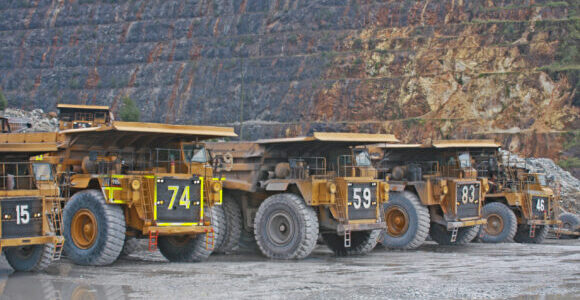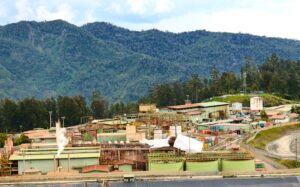In this exclusive interview with Business Advantage PNG, Barrick Gold’s President and Chief Executive Mark Bristow talks about the deal he made to restart the Porgera gold mine, the road to returning it to full production, and why addressing law and order is critical.

Porgera – Haul trucks assembled in the mine open pit. Credit: NPL
The recently reopened Porgera gold mine will be a “world-class” operation for a long time – providing its stakeholders uphold their end of the bargain, says Barrick Gold President and Chief Executive Mark Bristow.
As Barrick’s global head, Bristow was instrumental in the deal between Barrick Niugini Limited (BNL, a 50:50 joint venture of Canada-headquartered Barrick and China’s Zijin Mining) and the PNG government to form New Porgera Limited (NPL) and secure a new special mining lease (SML) for the mine in October 2023.
Porgera was put on care and maintenance in April 2020, following stalled negotiations over an SML. The 2023 deal saw BNL agree to reduce its interest in the mine from 95 per cent to 49 per cent, with PNG stakeholders, including Kumul Minerals Holdings, the Enga provincial government and local landowners, securing the remaining 51 per cent.
“Ultimately, it will be a world-class, 500,000 oz producer for a long time – if we can get it all right.”
Open pit mining resumed at Porgera in December 2023, and first underground ore was brought to surface in January 2024. The next major milestone came in April 2024 when 75 MW of power from the Hides gas-fired plant was restored, enabling a restart of the milling circuit and shipment of first gold.
Looking forward, Bristow says Porgera will ramp up production all the way out to 2028, and possibly even longer.
“Guidance is for 200,000 to 250,000 ounces (oz) of gold in 2024 and will go up to nearly double that before steadying out. Then we’ll add another 50 per cent,” he explains to Business Advantage PNG.
“If we can get this all sorted out efficiently, the profile will change. Ultimately, it will be a world-class, 500,000 oz producer for a long time – if we can get it all right.”
Law and order
Local factors pose a major challenge to the mine’s success, in the Barrick CEO’s opinion.
“It would be remiss of me not to point out that there are some serious challenges in the Porgera Valley,” Bristow says.
“This is an asset that has 51 per cent Papua New Guinean ownership – government, landowners and Kumul – and they need to fulfill their side of the bargain. That is their responsibility.”
“These are national assets: local business and local people should benefit from employment and contracts.”
“Security must be the top priority. Porgera is a fragmented community prone to tribal fights and disputes. Law and order and illegal mining are a constant challenge. Right now, there’s no magistrate, there’s no community policing infrastructure,” he says.

Mark Bristow, President and CEO of Barrick Gold. Credit: Barrick Gold
“Our message, which I share with Prime Minister Hon. James Marape at every opportunity, is that we really need to focus on security, otherwise we are not going to get the benefits of the new partnership that we all committed to.”
Porgera has more than 2,500 employees, and Bristow expects to recruit “between 500 and 700 more”. Its workforce is made up of 57 per cent Enga Province residents, 40 per cent from other parts of Papua New Guinea, and 3 per cent expatriates.
Message for landowners
The New Porgera agreement ensures PNG interests in the mine will collect 53 per cent of mine benefits after capital expenditure, with BNL receiving 47 per cent.
“Landowners get a 15 per cent carried share, whereas everyone else participates in funding the capital,” explains Bristow.
Looking back at Barrick’s involvement in Porgera, which began in 2006, Bristow says it helped build “one of the biggest and most successful local companies,” the iPi Group.
“I’m a big believer in locals. These are national assets: local business and local people should benefit from employment and contracts,” Bristow says.
But he warned that anyone looking to get involved in Porgera in future would need to establish a presence in the community.
“We’re not going to do business with people who land contracts with us, then leave the valley … and don’t actually put anything back into the community,” he says.
“Whether it’s Papua New Guinea or the Democratic Republic of Congo or Nevada in the US, we always seek to encourage and support and invest in local service providers. We invest in building their capacity and growing them, because it’s in our best interests.
“It’s part of taking this slice of the value of the orebody: some of it goes back to the country, some of it goes back to the investors, and some of it should go to building economic capacity for when the mine is no longer there.”
PNG: a ‘huge opportunity’
The processing plant at Porgera. Credit: NPL
Barrick is the world’s second-largest gold producer, operating 13 gold mines and three copper mines. Its projects and operations span 18 countries.
Although Porgera and PNG provide a “huge opportunity” for Barrick, they are only “a very small part” of its business at present, according to Bristow.
“As a global gold and copper miner, we are intrigued by the opportunity to grow our footprint in PNG, but it’s subject to being able to deliver on our business objectives,” he says.
“There’s no doubt that Papua New Guinea has a lot of mineral endowments. But money needs a friendly environment, and sometimes that’s not the case in PNG.”
For PNG to truly benefit from this endowment, he says, its leaders must rid themselves of short-term thinking.
“The government has got to start learning to share that benefit with the greater population of Papua New Guinea, because it’s a God-given endowment that really could transform that country into something very special,” he says.
At the same time, he acknowledges that he must “keep my shareholders focused on the value and the long-term benefits of where we are taking Barrick – and be cautious about the instant gratification demands. By its very nature, mining is a capital-intensive, long-term business.”
He adds: “I’ve spent hours with the prime minister talking about that, and I believe he gets it.”
Bristow concludes by revealing that his team has also reached out and is building relationships with investors in PNG’s gas projects.
“We have a big responsibility to work hard, to be an advocate for mining, and to prove to the people of Papua New Guinea that we do bring enormous benefits to that country,” he says.
“The more we can work with local businesses and local professionals, the more we’ll all be able to support the government’s objective of building a middle class which will, without a doubt, transform Papua New Guinea.”
This is a version of an article in the Business Advantage PNG Mining & Energy Special Edition 2024/25, which will be published next month.









Speak Your Mind